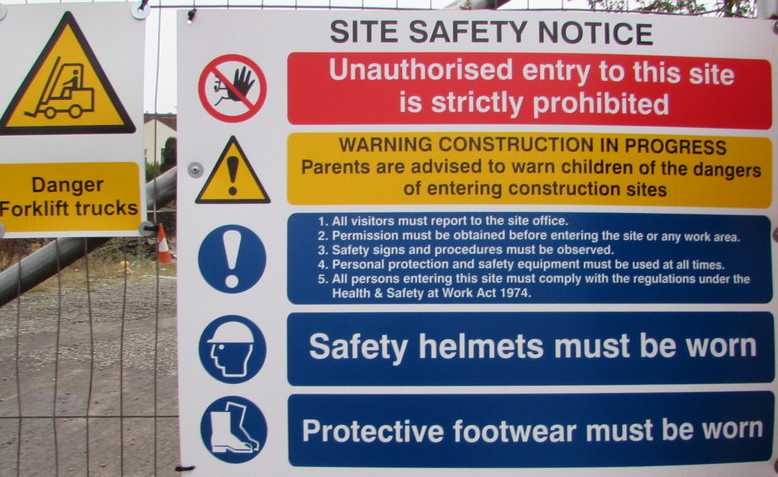 Site safety notice, Photo: Jaggery / cropped from original / licensed under CC BY-SA 2.0, linked at bottom of article
Site safety notice, Photo: Jaggery / cropped from original / licensed under CC BY-SA 2.0, linked at bottom of article
As lockdown measures continue to ease, we interviewed the TUC’s Shelly Asquith on the need to to protect workers’ health and safety and to confront bosses who shirk their responsibilities.
What are the risks associated with getting people back to work at the moment?
The risk of exposure to Covid-19 is still alive and dangerous. As the virus continues to move through the population, people are still falling ill and still dying. The numbers may be smaller than before, but as more ‘lockdown’ measures ease and we approach the start of the new school term, a ‘second wave’ remains a very real danger.
Outcomes are worse in workplaces where bosses are not taking seriously enough their responsibility to manage risks. We have seen several outbreaks in recent weeks in food processing sites and other factories.
What is more, millions of working-class people are either not entitled to Statutory Sick Pay (SSP) or cannot live on it because it is so low. Some 70% of people in one large workplace told their union they would still go to work if they fell ill because they couldn’t pay for food and bills on just £95 per week SSP.
If we are going to protect people, we need tough action against bosses shirking the law, and a sick pay system fit for purpose.
How are trade unions responding to these dangers?
We already know that workplaces with a strong union presence, and union health and safety reps, have less illness, injury and fatalities. This has only been more strongly evidenced by the Covid-19 crisis. There is a stark difference between workplaces where unions have successfully demanded full-pay for those self-isolating, played an active role in the risk assessment and PPE procurement processes and decided the workers’ response collectively. Some unions have seen a sharp rise in membership and the number of safety reps as people recognise the concept of safety in numbers.
But not all bosses listen to the unions, and in some workplaces we’ve seen branches lead walk-outs over safety fears, or demand action from the regulators.
In many sectors, unions are now also fighting the onslaught of redundancies as a product of the economic impact of Covid-19 – principally in aviation.
Do you have any advice for Health & Safety reps in workplaces?
Union safety reps are the experts in their workplace and should assert themselves as such. As the voice of the workforce, they are in the best position to flag concerns and alleviate anxieties. As workers on the ground, they know better than the bosses what issues can cause safety hazards and how they can be practically overcome. They also have strong protections in law, and a right to be consulted.
Reps can have the biggest impact when they involve the whole membership. When washing facilities or better sick pay is won as a result of a safety rep or committee demand, everyone should feel ownership of the victory. Health and safety issues can be organising opportunities to turn more workers into members, more members into activists: this is what the movement urgently needs.
What should people do if they feel unsafe in their workplace, and what if they aren’t a member of a union?
In an ideal situation, workers would raise a safety concern to their line manager and it would will be reasonably dealt with. Not everyone feels in a position to do that.
Where there is no union presence in your workplace, that doesn’t mean you can’t still act collectively.
If your boss is forcing people to work against your better judgement, or not taking seriously concerns like distancing, make a stand.
Reach out to your colleagues, it’s likely they’ll be feeling a similar way, and raise the issue as a group so as not to single any one person out.
There are laws which protect workers from detriment if they speak out or refuse to work in serious danger: but don’t rely on them alone. The most effective tool at your disposal is your power as working people standing together. If you’re not a member of a union, join one; and recruit your colleagues too. Where a union is recognised, you have a right to elect a safety rep, which couldn’t be a more important role to take on.
Before you go
Counterfire is growing faster than ever before
We need to raise £20,000 as we are having to expand operations. We are moving to a bigger, better central office, upping our print run and distribution, buying a new printer, new computers and employing more staff.

